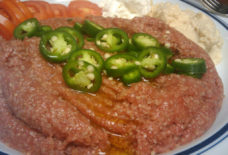Ancient Damascus Shows Travelers its Youthful Side
For years one of the Middle East’s hidden gems, the centuries-old city of Damascus in Syria is today claiming its share of the global cultural limelight.
Thought to be one of the world’s oldest continually inhabited cities, Damascus is rich in history, a famously vibrant place filled with ruins, mosques and bazaars.
Its old town was declared a UNESCO world heritage site in 1979, but it is increasingly a place to visit for contemporary art, chic boutique hotels, its lively cafe scene, theatre and international film festivals.
More and more attention is being paid to Damascus’ new, youthful side: in 2008, it was named Arab Capital of Culture and this May, the design and travel magazine Wallpaper* will be releasing a guide to Damascus, the latest installment in its influential series of city travel guides, for Phaidon press.
CNN selects some of the best spots to experience the cultural side of Damascus, from museums and galleries to chic bars and restaurants.
SEE
Damascus has a wealth of treasures, from ancient Roman ruins to the stunning 8th-century Umayyad Mosque, the pearl of the labyrinthine, walled old town. The mosque is said to hold the head of John the Baptist in an opulent tomb, which is frequently visited by Christian pilgrims. Next to the mosque is the tomb of the warrior Saladin, who fought the crusaders in the 12th century.
For yet more ancient treasures, head to the National Museum of Damascus in the west of the city, which holds artifacts from prehistoric times through to Roman, Greek, Byzantine and Islamic periods. It also holds ancient Syrian treasures such as the world’s first alphabet.
Not just an ancient treasure trove, Damascus is also increasingly a hub for local contemporary visual art and theatre. Hip new galleries in the city include the international space Ayyam Gallery. It which boasts some of the best new art from Syria, including work by sculptor Mustafa Ali, who also runs his own art foundation. Look out for Tajalliyat Gallery, which describes itself as “a space for cultural, intellectual, and artistic meeting.”
For culture vultures looking for live performance, the Dar al-Assad for Culture and Arts is the official opera house of Syria and has an impressive schedule of world-class concerts and performances, while the French Cultural Institute holds regular music recitals and talks.
SLEEP
Boutique hotels are springing up around Damascus, merging traditional Arabic interior design with modern comforts. The Beit al Mamlouka is a charming eight bedroom hotel in a renovated 17th century building in the Christian quarter of Damascus, where guests can stay in a suite featuring its very own rose-shaped fountain and a 230-year-old Christian fresco on the ceiling. Alternatively, stay at the Art House Hotel, a renovated former mill on the banks of the Barada river, which boasts a gallery, art cafe, events and concerts. Rooms and suites are named after Syrian musicians, artists and writers.
Those after a luxury stay can look no further than the ziggurat-shaped Four Seasons Hotel, one of the city’s main modern landmarks, in downtown Damascus. The pool and spa are perfect relaxation spots after a dusty day visiting ancient sites.
EAT
Damascus eateries are numerous, boasting delicious food, with plentiful herbs and spices, fresh meat, zesty salads and honeyed desserts. During the day, go local and peruse the pastry shops and market stalls offering simple, mouth-watering traditional cuisine.
For the evening, try Art Cafe Ninar, near the Eastern Gate of the city, a popular hangout for local artists and writers and which also has its own gallery. alternatively, dine on traditional Syrian fare at Leila’s Restaurant and Terrace, which has one of the best views of the city, overlooking the Umayyad mosque.
After dinner, take a seat at one of the city’s many coffee houses, where you’ll likely come across groups playing backgammon and poets reading their latest compositions. Though not known for its nightlife, the city does have a cluster of bars selling alcohol and boasting dance music, such as Marmara in the old town, where DJs spin a mix of Western and Arabic pop.
SHOP
Like their Beiruti neighbors, Damascenes are a smart crowd. The city boasts the plush Damasquino Mall, and plans for a new mega-mall on the Damascus-Beirut highway were announced late last year by Majid Al Futtaim Properties, the development company responsible for Dubai’s enormous Deira City Centre.
But by far the best and most colorful way to shop in the city it to get lost in the charming chaos of its many souks or bazaars — including the grand Souk al-Hamidiyah, near the Umayyad mosque — and haggle your way to a bargain.
Laura Allsop
CNN


